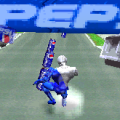- Cherry Tree High Comedy Club!
- Cherry Tree High! I! My! Girls!
- Cherry Tree High Girls’ Fight
With the word of mouth success Cherry Tree High received, 773 decided to try releasing a sequel to the original game. However, instead of trying to come up with a new premise that would take advantage of the first game’s mechanics, they instead decided to focus solely on story elements. The end result is that Cherry Tree High I! My! Girls! (weird name, I know) isn’t really a game.
I don’t mean “not a game” as in the common way that people use to attack a game they don’t like or understand, I mean it is absolutely not a game in the most basic definition. I! My! Girls! is what you call a kinetic visual novel, which is like a normal visual novel, except it takes those two words much more literally. There are no choices, no additional gameplay mechanics, no possible way for player input to affect anything in the work itself. It’s simply a story told with the additions of visual gags and cues alongside text. That’s not necessarily a bad thing, mind you.
Since the first entry, Mairu has managed to resurrect the school’s comedy club, with all of the recruits from the first game joining alongside her. However, she’s hit with another challenge to find a teacher who can supervise club activities (she really should have read the rules), a rival classical comedy club starts to wage war against the group, and a new student may completely shake up the club dynamic, and possibly not for the better. There are also three new characters of note.
Characters
Professional pop idol by night and normal high school student by day. Ai’s dream is to be a comedian, and she enters Cherry Tree High with a different last name to try and join Mairu’s comedy club. She’s a huge klutz and a bit of an airhead, but she knows her comedy.
A teacher who once looked after the previous comedy club. She was also an actress in her youth, which has given her an incredibly theatrical personality. Despite her silly appearance, she gives good warning to Mairu and Hoemi about what the future may hold. She’s also old friends with the head of Mairu’s dorm.
The president of the classical comedy club. She met Mairu during their first year and was amazed by her comedy skill, and now considers her a rival. Despite her conviction to her craft, she takes compliments a bit too well and has a short temper when dealing with dim people.
Since I! My! Girls! doesn’t require the player’s input, it has to stand up with just its writing alone, which it thankfully accomplishes. 773 took advantage of the new format to write out new situations that wouldn’t have fit in a game’s narrative, creating a series of scenes that play out like the episodes of a good comedy anime. They’re even ordered as a one cour season of twelve episodes, including five filler episodes devoted solely to comedy and character bits.
The three new characters really add a lot, though they break the laid back tone of the first title with their much more exaggerated personalities. Utena is the particular stand out, as everything that comes out of her mouth is either effectively dramatic or so ridiculous that you can’t help but be entertained on some level. Imari stands out with how much she clashes with Mairu, but also with how similar the two are in places. Her tutor scene is also really damn funny.
The star of the new characters is easily Ai, who’s absolutely central to the main story and character arc. Unlike the first game, Mairu takes a backseat to her sidekick Hoemi this time around, as Hoemi struggles with the possibility that she won’t be able to live with Mairu as she has. The stakes this time come from characters realizing that relationships change overtime, and their fear of that change. Hoemi’s problem comes from how naturally brilliant Mairu is at comedy, thanks to her natural charisma, and the presence of Ai starts to form a divide between herself and Mairu. It’s an interesting idea that the story uses very well, creating a strong central arc that caps off in a way that doesn’t betray the series’ previous exploits and feel.
The real fun comes from the five sub episodes. These episodes ignore the main story arc and show a slice of the lives of the various cast members, most notably Ravian. Character personalities are simplified or played up more here as well, leading to Ravian and Amane becoming proud idiots that only cause frustration and pain for anyone unlucky enough to cross their path. This also leads to more scenes with the town’s shrine maiden, who is both the creator’s favorite and an amazing, bizarre straight man somehow even stranger than the lunatics around her. She once even tries to get out of tutoring Ravian and Amane by pretending to be a cousin nobody has ever met before in an incredibly unconvincing way, and keeping up with the act even when everyone is completely aware she’s lying terribly.
This title also doesn’t have the localization problems the first game had, and its translation even inspired the team to fix the first game’s westernization. Still, this isn’t a professional translating group here, so a few weird lines still find their way in (did the shrine priestess just call someone a jabroni?), but it fits well enough with the silly tone, especially any scene involving Ravian getting a saying wrong. If there are any problems, its that the Ai storyline ends too easily, while another new character introduced as a possible member of the yakuza gets almost no development or even character definition.

